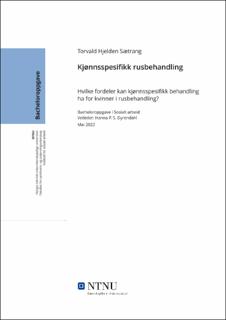| dc.contributor.advisor | Dyrendahl, Hanna P. S. | |
| dc.contributor.author | Sætrang, Torvald Hjelden | |
| dc.date.accessioned | 2022-06-29T17:19:57Z | |
| dc.date.available | 2022-06-29T17:19:57Z | |
| dc.date.issued | 2022 | |
| dc.identifier | no.ntnu:inspera:111265159:47338608 | |
| dc.identifier.uri | https://hdl.handle.net/11250/3001612 | |
| dc.description.abstract | I generasjoner har forskning og fokus på menns helse hatt forrang foran kvinners helse. Dette gjelder også i aller høyeste grad innenfor rusbehandlingens domene. Temaet i denne oppgaven er kjønnsspesifikk rusbehandling og problemstillingen lyder som følger: «Hvilke fordeler kan kjønnsspesifikk behandling ha for kvinner i rusbehandling?». I Norge var behovet for å tilpasse rusbehandlingen for kvinner allerede tematisert i 1992 gjennom Statsmelding nr. 69, uten at den helt store revolusjonen har skjedd siden den gang. Litteraturen viser i stor grad at kvinner vil ha høyere fullføringsrate ved kjønnsspesifikk behandling, noe som indikerer at det foreligger fordeler ved denne type behandling. Videre bekrefter litteraturen at det finnes en rekke fordeler for kvinner når de får kjønnsspesifikk behandling. Disse fordelene sees i oppgaven i direkte sammenheng med forhold som vil kunne gjøre seg gjeldende i blandet behandling. Av fordelene som dukker opp finner man blant annet at man gjennom kvinnerettede tiltak potensielt vil ha mer kunnskap om kvinners behov, som vil kunne føre til bedre tilrettelagt behandling. Dette fordi blandet behandling ofte er preget av en overvekt av mannlige pasienter, noe som også vil prege behandlingen som tilbys på institusjonen. I tillegg vil det faktum at menn ikke er tilstede hindre at en rusavhengigs behov for bekreftelse fra det motsatte kjønn stjeler fokuset fra behandlingen. Kjønnsspesifikk behandling eliminerer også kvinners frykt for å møte på tidligere partnere og ustabile menn i behandling. Kvinner med traumer knyttet til for eksempel seksuelle overgrep utført av menn vil også kunne nytte bedre av kjønnsspesifikk behandling enn blandet behandling, hvor de kan risikere å måtte fortelle om traumene i samtalegrupper bestående av en overvekt av menn. Litteraturen i oppgaven er innhentet gjennom strategier for systematisk litteratursøk i databaser med forutbestemte søkeord. I tillegg er det benyttet pensumlitteratur og håndsøk for å finne utfyllende litteratur. | |
| dc.description.abstract | For decades research and focus on men´s health has taken precedence over women´s health. This will also apply in terms of the drug treatment domain. The theme of this thesis is drug treatment and the research question is as following: «What benefits can gender-specific treatment have for women in drug treatment?». In Norway, the need to adapt drug treatment for women was addressed already in 1992, through Government Report no. 69, without this leading to any great revolution. The literature show to a large extent that women will have a higher completion rate with gender-specific treatment, which largely substantiates the fact that there are benefits to this type of treatment. Furthermore, the literature confirms that there are a number of benefits for women when they attend gender-specific treatment. In the thesis these benefits are seen in direct connection with conditions that may occur in mixed treatment. Among the benefits we find that through gender-specific initiatives one might have more knowledge about women´s needs, which eventually could lead to better adapted treatment. Mixed treatment is often dominated by male patients, which affects the treatment offered at the institution. Also, the fact that men are not present will prevent a drug addict´s need for confirmation from the opposite sex from stealing the focus from treatment. Gender-specific treatment also eliminates women´s fear of encountering unstable men in treatment. Women with trauma related to sexual abuse committed by men will also be able to benefit better from gender-specific treatment than mixed treatment, where they may risk having to share trauma stories in discussion groups mainly consisting of men. The literature in this thesis is obtained through strategies for systematic literature search in databases with predetermined keywords. In addition, syllabus literature and manual searches have been used to find supplementary literature. | |
| dc.language | nob | |
| dc.publisher | NTNU | |
| dc.title | Kjønnsspesifikk rusbehandling: Hvilke fordeler kan kjønnsspesifikk behandling ha for kvinner i rusbehandling? | |
| dc.type | Bachelor thesis | |
